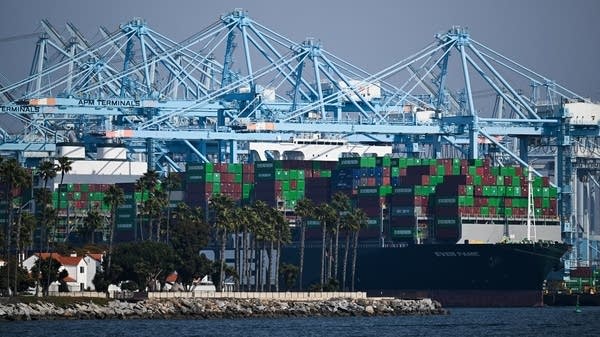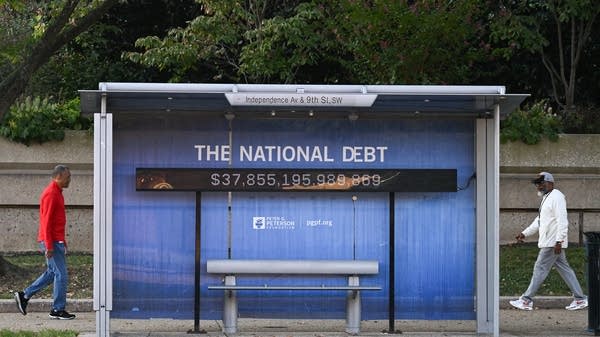Why billionaire Ray Dalio is worried about a "bond market heart attack"
It has to do with what he considers a troubling trend in U.S. government debt.

We're continuing to track the big tax and spending bill winding its way through Congress, which would add $2.4 trillion to the U.S. government deficit over 10 years, according to the nonpartisan Congressional Budget Office. The legislation is still in the midst of changes in the Senate, before all of Congress signs off on a final version to be sent to President Trump’s desk for approval.
But if the resulting law adds to the government spending deficit and accumulating debt — which it almost certainly will — Ray Dalio is worried. The billionaire founder of the biggest hedge fund firm, Bridgewater Associates, believes we’re approaching a limit on how much the federal government can borrow. And he says there are signs of that in the bond market.
He’s written about what he calls the debt cycle and other related topics in a new book, “How Countries Go Broke: The Big Cycle.”
Dalio joined “Marketplace Morning Report” host David Brancaccio to discuss, and the following is an edited transcript of their conversation.
David Brancaccio: You and I have talked about this before, Ray. There are business cycles — boom and recession every, I don't know, six years or so. Administrations come and go, borrowing more, maybe borrowing less. Those are the smaller cycles that we get obsessed with. But you're more concerned with what you see as the long debt cycles. Do you see us as getting close? Are we at one of these inflection points for the big cycles?
Ray Dalio: Yes, we're approaching the inflection point. And let me describe what that's like. The big cycle is when debt and debt service rise relative to incomes, which reaches a point — an inflection point — that that can't continue. Think of the credit market system like the circulatory system in your body, and it brings credit to all different parts of the body, and that those are like nutrients. And if they're used well, they'll produce productivity and incomes that are good for servicing the debt. So debt isn't bad if it produces the incomes.
But when you're in a position where the debt accumulates relative to the income, then debt service payments squeeze out spending. So you can see that happen, and then there's a supply/demand problem. … There's a lot more selling of the bonds, the demand can fall short of that supply. … That is where you start to reach the inflection point. At that point, central banks print money, come in and try to buy, but they're losing money. And so we can measure and see these things on charts, like a doctor looking at a patient, and then we can now, as we're looking at those things, we have to worry.
Brancaccio: A regular person is not going to say, “Oh, my goodness, we're at an inflection point.” They're going to be worried about a financial crisis where maybe they can't borrow and they need to. I mean, that's what you're talking about if we don't get this right.
Dalio: That’s right. And in order to get it right, because we are approaching one of those — that's what I mean by an inflection point. It's like a bond market heart attack. We have to cut the deficit down to 3% of GDP. And that's been done before, a big cut in that deficit, and there are three ways of doing that. The first, of course, has to do with taxes — tax revenue, not necessarily tax rates, but tax revenue. No. 2 is spending, and No. 3 are interest rates. And we're at a point that if a budget was cut down to about 3% of GDP, from about 7% where it is now, that you would actually have interest rates come down. The interest rate component of the debt service is even about twice as important as the spending or the taxation. Everybody's focusing on spending and taxation, but if you have a bad supply/demand picture for the bonds, you're going to have interest rates rising, and the debt service will be a problem, too. And the other is also true: If you cut those expenses down or cut the budget deficit down to about 3% of GDP, you will have interest rate relief, and all three can work for a sustainable situation.
Brancaccio: What are you seeing for projected debt-to-GDP ratio if what's coalescing in Congress goes forward higher than what you're just talking about?
Dalio: Yeah, we're going to have about a 7% deficit as a percentage of GDP. [And the amount of debt to GDP ratio is over 100%.] It shows up in the market action when you see the bonds go down at the same time as the dollar weakens, and you see gold prices going up, and you see stock prices going up. That is reflecting the withdrawal of capital from the bond market, or other markets. And, of course, the bond market is the backbone of all markets. The Treasury market is the risk-free interest rate. When we call it risk-free, meaning we don't expect it to default because the government will print the money.
Brancaccio: These processes are certainly not happening in a vacuum. There's kind of a dialogue between the markets and maybe policymakers. Let me put it this way: Could it be argued that the main check on executive power in America, the president's power, you could say, is the bond market these days? Because the bond market calls it as it sees it.
Dalio: Yes, certainly and unfortunately, because when that happens is the worst possible time to try to deal with it. In other words, it's to have the heart attack and then to be trying to deal with it. I'm hoping that people will look at the supply/demand and mechanical aspects of this to see where we are. Treat it as though you're at your doctor, and the doctor is saying, “This plaque is building up. You're getting to a very serious situation. Please deal with it now before you have a heart attack.”













